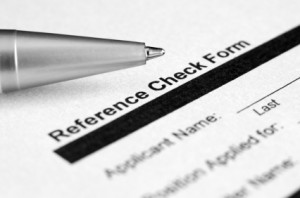5 Must-Knows on Providing Job References
 As a staffing firm, we see this scenario on occasion: Job candidates send in their resumes, interview with recruiters, interview with a client and are this close to being hired, when the client asks for references to decide which of the final candidates to go with. As a potential job candidate, are you reference-ready?
As a staffing firm, we see this scenario on occasion: Job candidates send in their resumes, interview with recruiters, interview with a client and are this close to being hired, when the client asks for references to decide which of the final candidates to go with. As a potential job candidate, are you reference-ready?
Even if you’re a consultant, you need to keep your list of references current, thorough and accurate, and be prepared to send them to the recruiter at the time of the interview with a client. Follow the tips below to ensure you’re top of mind in any race to be hired.
Why do you need job references when you’re a consultant?
Because hospitals are often under deadline pressure to complete coding and software update requirements, they need consultants to hit the ground running in positions as soon as a few days from an interview. If you and another equally skilled health IT job candidate interview well and at about the same time, your references may be the deciding factor that sets you apart from the other candidate. In fact, sometimes it’s a matter of how fast the client can speak to your references.
How do you ask someone for a reference?
First, get your references’ permission before you give out their information, and know what they are going to say about you – that is, that they’re willing to give you a good reference. Ask by phone or email, or ask your supervisor in person just before a project’s end. You can say something like, “I enjoyed working here. If you believe I did a good job, I hope I can use you as a professional reference as I seek my next project.”
Received any written kudos or testimonials from a past manager? Keep them, and send them to your recruiter – they’re useful and can often help secure an interview.
What types of references are preferred?
For seasoned consultants, a former or present manager, team lead or respected coworker should be on your references list. Consultants with multiple skill sets and certifications may need to keep a fairly diverse set of references, as hiring managers hone in on software module-specific experience for open health IT positions. Have three to five strong references, with heavier consideration given to those you have worked for or with in the past. Do not list family members or close friends as references.
What information should you have about your references?
Keep it brief, but provide each reference’s name, preferred phone number, email address, present title and employer and relationship to you. When you provide references, paste their information into the body of an email, instead of sending them as a separate attachment, advises Allison Doyle, a job search and employment expert, in an article on employment references. Find out from your references how and when they prefer to be contacted, and pass that information along to your recruiter.
Alternately, a referral letter from a past manager on hospital letterhead, sent as a PDF, is a great reference source.
How often should you update your references?
Send your references with your updated resume, after each assignment, unless your immediate past assignment was only two to four weeks long, to your recruiter. Consultants should touch base with their references once or twice a year to ensure their contact information, title and contact preferences are up to date.